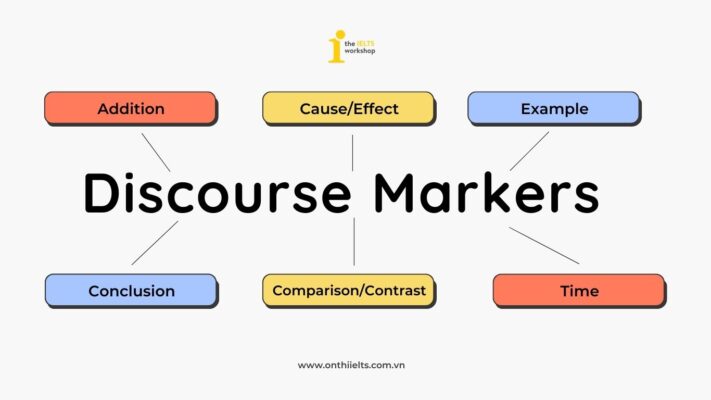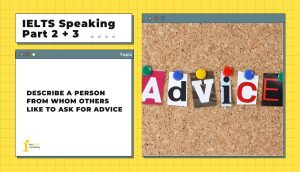Trong chuyên mục giải đề dưới đây, thầy Viết Dũng của The IELTS Workshop HN sẽ hướng dẫn bạn trả lời topic “Describe a person who always has interesting ideas“ trong IELTS Speaking Part 2. Cùng tham khảo sample, từ vựng và một vài cách diễn đạt ghi điểm trong phần thi IELTS Speaking nhé.
Part 2: Describe a person who always has interesting ideas
Describe a person who always has interesting ideas
You should say:
Who this person is
What this person does
How you knew him/her
And explain why you think his/her ideas or opinions are interesting
Dưới đây là bài mẫu cho topic “Describe a person who always has interesting ideas“.
1. Bài mẫu (Sample)

2. Từ vựng (Vocabuary)
- Intrigue (v) sb: làm ai đấy tò mò
- Meticulous (adj): tỉ mỉ
- Hit it off with somebody: hợp với ai đấy
- Pick somebody’s brain: xin lời khuyên từ ai
- Superficial (adj): nông cạn
Part 3
1. When do you think children start to have their own opinions?
2. Are children’s opinions influenced by their parents?
3. Who are smart children likely to be influenced by?
4. How do inventors or philosophers come up with new ideas?
5. Are there only old ideas from books or previous writers?
6. What kind of people have lots of great ideas in your country?
1. When do you think children start to have their own opinions?
Well, I think this is a process that started in their early years, when they’re young, and it usually becomes more prominent in their teenage years. At that age, they’re really starting to think independently and form their own beliefs on a lot of things, including their views on politics, their aspirations, and so on. I believe at that age, they’ve realized that the world isn’t just black and white, but a rather complex place, and they are emotionally mature enough to navigate through that realization and have their own interpretations of the things they see around them.
- Prominent (adj): rõ ràng
- Think for themselves: suy nghĩ một cách độc lập
- Interpretation (n): Cách hiểu, diễn đạt
- Navigate (v): Xử lý, vượt qua
2. Are children’s opinions influenced by their parents?
That could be a hit-or-miss.
Since parents are a child’s caregiver during the first years of their lives, moms and dads have a strong impact on what constitutes their child’s fundamental core values, and by extension, their worldviews. I mean, they don’t say “the apple doesn’t fall far from the tree” for nothing, and a lot of children’s personalities are inherited from their parents.
Although, there are some children who can be drastically different from their parents in terms of perspective, likely because of the generation gap. The parents might hold conservative views about things, whereas the child might be more open-minded and progressive
- Caregiver (n): Người chăm sóc
- Core values: Giá trị cốt lõi
- The apple doesn’t fall far from the tree: “con nhà tông không giống lông thì cũng giống cánh”
- A hit-or-miss: Something that can be true or wrong
- Conservative (Adj): Bảo thủ
- Progressive (Adj): Cấp tiến
3. Who are smart children likely to be influenced by?
Well it’s most likely gonna be their role models, but not just any role model. Smart children can be quite critical, so they likely can’t be influenced by people who they look down on or believe can’t offer them anything valuable. It’s gotta be someone they respect in terms of intellectual capacity or achievements, maybe a well-established figure in the field they wanna pursue or a person who’s financially successful like Bill Gates or Jeff Bezos. They could also look up to a senior at school who has more experience than them or has achieved a lot academically, and model themselves after those seniors or seek them out for advice.
- Role model: Hình mẫu, thần tượng
- Critical (adj): Phê phán, xét nét
- Look down on: coi thường
- Well-established (adj): có uy tín, thành công
4. How do inventors or philosophers come up with new ideas?
Well, I’m neither a philosopher nor an inventor, but I guess the best way to do so is to always be on the lookout for inspiration in everyday life. Ideas come in all shapes and sizes, and they could come from anywhere, as evidenced by Newton’s discovery of gravity simply by observing apples falling from trees.
You also need to practice brainstorming ideas a lot as well. Creativity and innovation are like muscles, the more you exercise them, the better you become at them.
- Be on the lookout for something: Tìm kiếm cái gì đấy
- Inspiration (n): Cảm hứng
- Come in all shapes and sizes: Muôn màu muôn dạng
5. Are there only old ideas from books or previous writers?
I would beg to differ. Even though some books are written in the past by writers from another time, the message and ideas they convey will continue to remain relevant.
This is especially true in academia, where you have books that were written in the previous century but are still being cited in research today, because they were groundbreaking books that laid the foundation for some branches of research.
Besides, existing knowledge is constantly being built upon using knowledge from old books and writers, and sometimes, they’re interpreted in a new direction, so I would not characterize them as “old”.
- Beg to differ: không đồng ý
- Relevant (Adj): phù hợp, liên quan
- Groundbreaking (Adj): Mang tính đột phá
6. What kind of people have lots of great ideas in your country?
Well, off the top of my head, they’d have to be content creators. Since the nature of their work is to attract people’s attention, they constantly have to churn out new ideas.
For example, you got content writers in charge of a Facebook fan page for a company, who got lots of ideas for different types of posts that could boost engagement on their page, such as posting hilarious content like memes or coming up with giveaway events.
Another example would be Youtubers, who need to create new and exciting videos on a regular basis to maintain their channel. The successful ones are often very creative and can produce videos that are relatable to people, pique their interest, or are so novel that they attract millions of views.
- Churn out: nghĩ ra, làm ra
- On a regular basis: thường xuyên
- Relatable (adj): gần gũi-
- Pique somebody’s interest: khơi gợi sự hứng thú của ai
Bài mẫu bởi thầy Viết Dũng – Giáo viên The IELTS Workshop HN
Trên đây là bài mẫu cho topic: Describe a person who always has interesting ideas. Các bạn có thể tham khảo các bài mẫu IELTS Speaking khác của The IELTS Workshop cũng như làm bài test trình độ IELTS tại đây, từ đó đề ra cho mình lộ trình ôn luyện chuẩn xác nhất nhé!
Để có thể học và nắm được phương pháp xây dựng câu trả lời cho phần thi IELTS Speaking Part 3, tham khảo ngay Khóa bổ trợ từng kỹ năng IELTS chuyên sâu của The IELTS Workshop.









